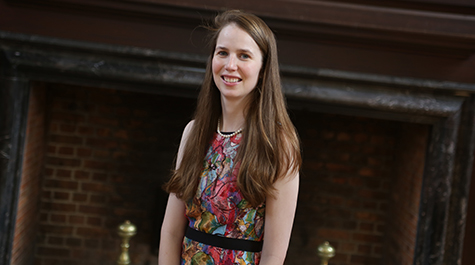Lashley Helps Client Get Clemency Through Pro Bono Work
Claire Lashley J.D. ’17 got a wonderful Thanksgiving gift on November 22 – news that her summer pro bono work at a large firm in New York City had made a difference.
“I helped write a petition for clemency for a client who was sentenced under particularly harsh drug sentencing guidelines,” Lashley said. “I found out that President Obama granted our petition for clemency and commuted our client’s sentence.”
Lashley’s success came about through her work as a summer associate at White & Case, in New York City. The firm takes pride in its pro bono efforts and encourages summer associates to participate in firm pro bono work as part of its summer program. After graduation this May, Lashley will return to New York City as an associate in White & Case’s litigation (competition) group. She will be working on antitrust and intellectual property issues.
Last summer, Lashley teamed with a small group of summer associates and attorneys to help the client, who had been sentenced to more than 20 years in prison for possession of a small amount of crack cocaine. Under current federal drug sentencing guidelines, the client would have received a far lighter sentence.
In addition to arguing that that the client’s sentence was not consistent with current federal guidelines, the team demonstrated that he had improved his life dramatically in prison. Not only had he completed a significant amount of educational training, but he plans to work as a mechanic upon release.
On November 22, Lashley and the team learned that President Obama approved the petition for clemency as administration officials moved quickly to rule on pending clemency applications before the end of the president’s term.
“Our client’s sentence was significantly reduced and he will be released within the next two years,” Lashley said. “Our client and his family were thrilled, as were we.”
Lashley became interested in clemency work because it seemed like a concrete way to address a discrepancy in sentencing that had long bothered her.
“Federal sentencing guidelines have historically punished crack cocaine possession and distribution much more severely than comparable possession and distribution of regular cocaine,” Lashley said. “Crack cocaine has typically been associated with poor defendants of color, unlike regular cocaine which is more commonly associated with the white and wealthy.”
Lashley graduated cum laude from Dartmouth College with a B.A. in Classics, where she was president of the Epsilon Kappa Theta sorority. At William & Mary, she is a member of the William & Mary Law Review, deputy chair of the Honor Council, a Legal Practice Fellow, and a Dean’s Associate. She spent summer 2015 as a research assistant for Professors Evan Criddle and James Dwyer.
William & Mary’s focus on the citizen lawyer encouraged Lashley to take advantage of the pro bono opportunities White & Case offers. And she will continue her efforts on behalf of others well into the future.
“My William & Mary education has trained me to give back where I can, and to use my legal skills for good,” she said.
About William & Mary Law School
Thomas Jefferson founded William & Mary Law School in 1779 to train leaders for the new nation. Now in its third century, America's oldest law school continues its historic mission of educating citizen lawyers who are prepared both to lead and to serve.
